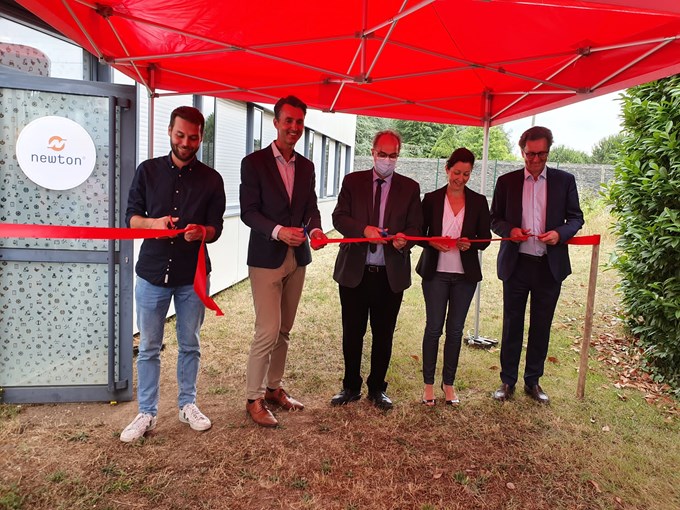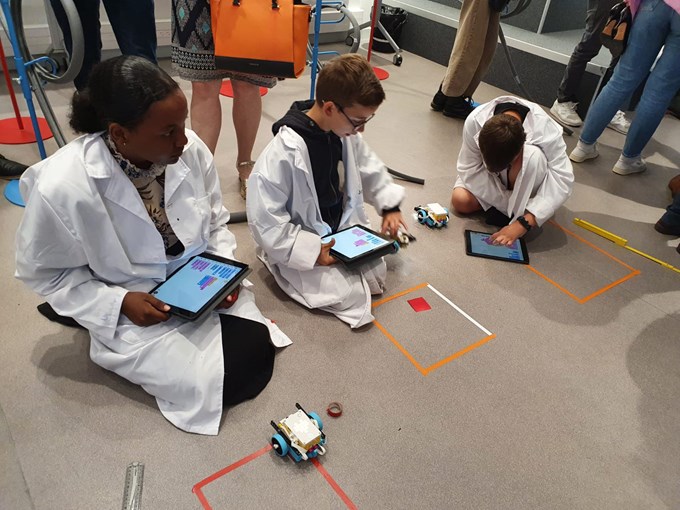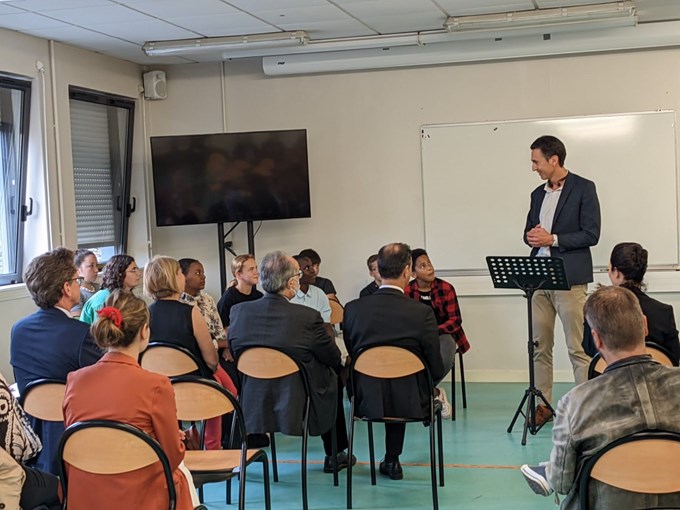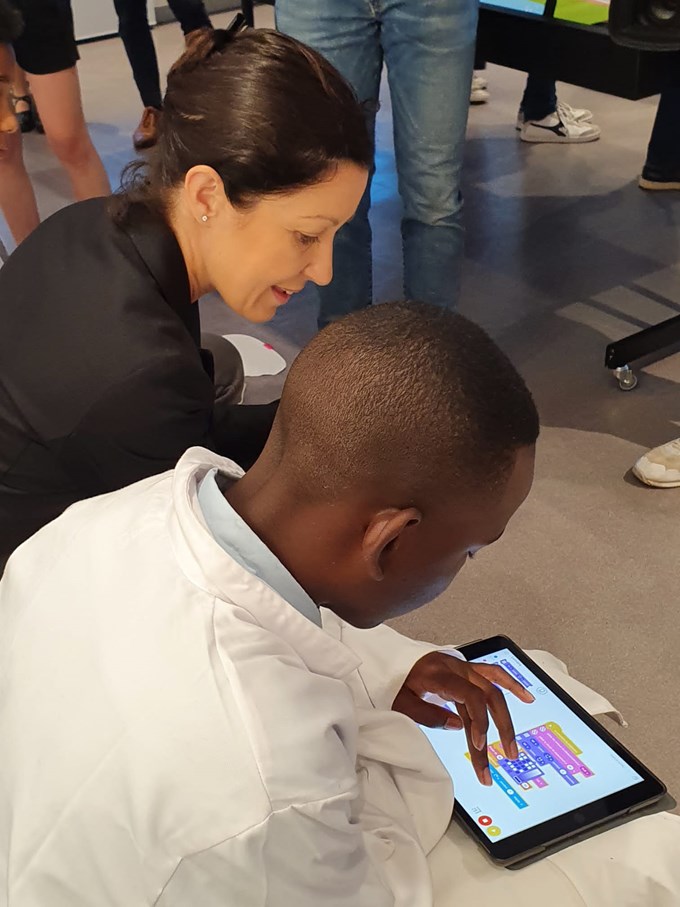Recent reports have shown that primary and secondary students across France continuously demonstrate a low interest in studying science and mathematics and that there are stark inequalities between genders in the areas of science, technology, engineering, and mathematics (STEM). "It is in this context and in the face of this challenge that the Newton Concept fits in -- namely to offer an innovative, high-quality science learning experience, and to make it accessible to all, regardless of economic and social conditions, age or gender,” explains Estelle Rossi, the Director of Programs and Quality at the Fédération Léo Lagrange. The Fédération is the national operating partner of the Newton Concept in France and has been working to expand the concept’s reach since the beginning of 2020.

To officially mark the opening of the Newton Room in Angers, there was a ribbon-cutting ceremony. From left to right: Guillaume de Chazournes, Director of Hubs Leo for the Fédération Léo Lagrange; Jean Lenoir, Head of the Félix Landreau Middle School; Benoît Dechambre, Director of the Academy of Angers; Florence Dabin, President of the Department of Maine-et-Loire; and Jean-Marc Fron, Managing Director of Boeing France. Photo credit: Fédération Léo Lagrange.
A permanent STEM classroom in Angers
The Newton Concept has already shown excellent results in making STEM education more accessible in France – including in Angers, where the first permanent Newton Room in the country officially opens today at the Félix Landreau Middle School.
In May of 2021, the Mobile Newton Room was initially hosted in Angers for a three-week stint to trial the novel educational concept in the city. Based at the Jean and Auguste Renoir Middle School, 364 middle school students from the local school, as well as others from the area, took part in Newton programming for the first time. Almost 85% of the students who participated confirmed they had “learned a lot” about mathematics due to the hands-on, immersive educational experience they had during their visit to the temporary Newton Room in their community.
Building upon the foundations of the mobile event in 2021, the new permanent Newton Room in Angers will initially serve students from area schools and community-based organisations. Already between April and June, the Newton Room has reached 415 young people from eight different schools and several community centres in the surrounding area. It is expected that approximately 3,000 children and youth will visit the Newton Room on an annual basis.
During their visits, students will be able to participate in one of the two modules currently offered. In Robots and Circumference, the students learn mathematical concepts related to perimeter and test their calculations by programming a LEGO® robot. The second module is called We explore energy! In this module, students build their own ball track and use it to track and study the difference between potential and kinetic energy, as well as the laws of energy conservation.

Students complete the third activity of the Robots and Circumference module, where they design a shape and program the robots to travel around the perimeter of it. Photo credit: Fédération Léo Lagrange.
The possibility for all students to engage with STEM
Stanislas Gabrovsek, a technology teacher at the Félix Landreau Middle School and one of the Newton Teachers in Angers, believes that there is great value in inviting students to visit a Newton Room. "The five hours of the module are not just about checking off items on the students' skill set,” Gabrovsek says. “There are so many other benefits to their participation including working in teams, experimenting, making mistakes, discovering, and writing up their conclusions. Students will be very active and challenged during the sessions in the Newton Room, and it will open new possibilities to help them discover the usefulness of science."
The practical application of STEM concepts in the Newton Room will also help engage a diversity of learners. Delphine Viau, also a Newton Teacher and the Head of the Resource and Engineering Center of Terre de Sciences based in Angers, agrees. “Collaborating in workshops, on practical situations with varied scientific and technological equipment, empowers students with academic difficulties. When a student can manipulate or experiment, they will often not experience the same difficulties they have in their regular classroom. Many students reveal their strengths during a visit to the Newton Room.”
Bringing a diversity of partners together
The Newton Concept brings together a variety of different stakeholders to make STEM education more accessible. “One of the greatest strengths of the Newton Concept is that we are able to bring together players who are not used to working together,” explains Sébastien Delannoy, who is the Newton Project Manager at the Fédération Léo Lagrange. “In Angers, this includes, among others, the Boeing Company, the Caisse des Dépôts, the Department of Maine-et-Loire, the Academy of Nantes, and the Directorate of Departmental Services of National Education in Maine-et-Loire, who worked together to establish the new Newton Room at the Félix Landreau Middle School.”
The room is sponsored by The Boeing Company, which has been an avid supporter of the Newton Concept since 2015 and has played a key role in its European expansion – including in France. According to Jean-Marc Fron, the Managing Director of Boeing France, “Boeing wants young people to make the most of what is offered to them so that they can later become the leaders that will contribute to solving the great challenges of tomorrow.”

During the ceremony, the Head of the Félix Landreau Middle School, Jean Lenoir, invites sixth graders to share their perspectives about having a Newton Room on their school premises. Photo credit: Fédération Léo Lagrange.
Next steps in France
Following the official opening of the Newton Room in Angers, the team at Fédération Léo Lagrange will turn their attention to establishing Newton Rooms in other cities – starting with Paris, Dijon, and Marseille. Their aim is to use the Newton Concept to create an educational ecosystem that will encourage more students in France to develop STEM competencies.

A local student shows Florence Dabin, the President of the Department of Maine-et-Loire, how to program a robot using block coding. Photo credit: Fédération Léo Lagrange.